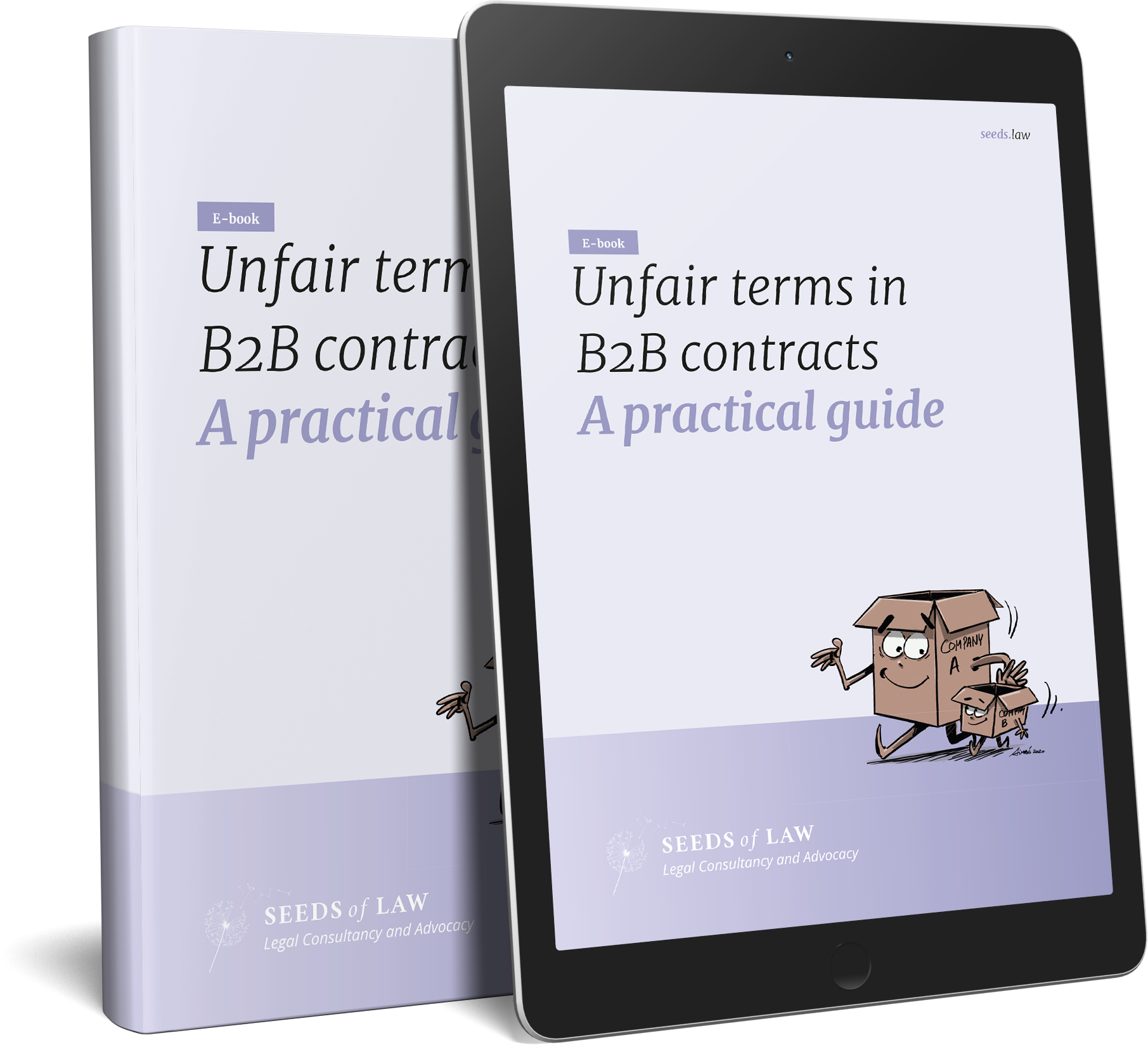- Real Estate, Renting and Co-ownership
- B2B , unlawful terms , commercial lease , commercial rental contract , commercial rental agreement , office rental contract , rental contracts
The B2B Law applies to all types of contracts concluded between businesses and therefore also to all business-to-business rental contracts.
Common types of business-to-business rental agreements are the commercial rental and the office rental.
Since the commercial rental law is also mandatory, except where the law allows for a deviation, some situations will cause a difficult balancing exercise.
Below we discuss further the application of the new B2B legislation to these types of contracts.
1. How will the B2B law interact with the law on commercial rental agreements?
Unlike ordinary contracts (including contracts for the rental of office space), commercial rental agreements are governed by the Commercial Rental Law.
Except where the law allows a deviation, the provisions of the Commercial Rental Law are mandatory.
However, the law allows a wide range of situations where the parties have the freedom to deviate contractually from the law. One of these situations relate to renovation works carried out by the tenant to make the premises suitable for his business.
As is the case for the renting of office space, where it is always possible to deviate from the ordinary law, (admittedly more limited) contractual freedom for own negotiated clauses with regard to commercial rental agreement is foreseen.
However, the B2B legislation has introduced additional restrictions to this freedom, as a result of which certain clauses may no longer be lawful, pursuant to this law.
It is therefore important to check whether the clauses in your contract can stand the test of "lawfulness".
Here too, it is necessary to be extremely vigilant and even to have checked the legality of the standard contracts, used up to now.

2. Which typical clauses in a commercial rental agreement can be questioned?
As you could already read in our other articles in this series, there is a so-called "black" and "grey" list of unlawful clauses.
The "more limited" blacklist contains clauses that will always be considered as unlawful.
The grey list, on the other hand, contains clauses that are presumed to be unlawful, but the contrary can be proved.
For clauses in the grey list, you will have to prove that, in the given circumstances and given the characteristics of the contract, such clause does not create an "manifest imbalance" between the rights and obligations of the parties.
It will therefore have to be proved that the parties, i.e. the tenant and the landlord, actually wanted to conclude the relevant arrangement.
In order to demonstrate this "actual will" of the parties, one will need to be able to provide proof of it. This proof can be provided either by a written record of the prior discussions (e.g. e-mails) or by explicitly including this will in the contract itself. Here too, it is strongly advised to keep as much evidence as possible and to confirm what is discussed or agreed verbally in writing (e.g. by e-mail).
A vast majority of rental contracts comprise standard clauses that cannot (or no longer) pass the test of legality, unless it can be proved that this was the real will of the parties.
We give a number of examples below:
Example 1
It is almost standard practice to state that the tenant has carefully examined the property and acknowledges that it is in a good state of repair and that no other or further description of it is required by him.
In accordance with B2B legislation, the means of proof on which the other party can rely may not be limited.
When it is not possible for a tenant to acquaint himself (effectively and completely) of the condition of the rented property before the conclusion of the contract, such clause may be considered null and void, except for proof to the contrary. After all, the condition of the rented premises may still change between a visit and the conclusion of the (commercial) rental contract.
It must therefore be the actual intention of the parties not to have a detailed location description drawn up.
Example 2
According to the B2B legislation, one cannot inappropriately exclude or limit the legal rights of a party in the event of a full or partial breach of contract or in the event of a defective performance by the other company of one of its contractual obligations.
Therefore, the clause that even in the event of force majeure, the tenant must continue the lease without any consideration, e.g. in case of execution of works, cannot be blindly accepted but must be drafted in such a way that there is no unlawful manifest imbalance.
False Read alsoDiscover our e-book about unfair terms in B2B contracts
In our e-book “Unfair terms in B2B contracts” you will discover a number of interesting tips to familiarize yourself with the new principles of the B2B law.

Example 3
The clause by means of which the tenant waives any recourse against the landlord, in particular on the basis of articles 1382-1386 and 1721 of the Civil Code, is a clause that often appears.
The legality of such clauses could now, without more precise wording, be questioned.
More specifically, this concerns clauses by means of which the tenant waives any recourse against the lessor based on the latter's liability for
- damages caused due to the collapse of a building because of a lack of maintenance or a defective building;
- defects in the rented property which prevent its use, even if the lessor was not aware of such defects at the time of concluding the contract;
- and the landlord's civil liability in general.
From now on, it is no longer accepted that the economic risk is placed on one party without consideration, where it normally rests on the other company or on another party to the contract, unless proof is provided to the contrary.
More specifically, are aimed at, clauses that release the company (landlord) from liability for willful misconduct, gross negligence or that of its agents or, except in cases of force majeure, for the non-performance of essential obligations which are the subject of the contract,
Example 4
The lessor is obliged to deliver the rented object in a good state of repair in all respects. During the rental period he must carry out all necessary repairs, except those which are the responsibility of the tenant.
If the lessor were to completely exclude his duty in this respect by contract, this clause could be regarded as unlawful.
Although this maintenance obligation is not mandatory, it is an essential obligation of the landlord to provide the tenant with peaceful enjoyment.
Example 5
As in all other contracts, rent agreements also contain a late payment interest clause in case the tenant fails to pay the rent on time.
However, the interest rate and punitive clause may not excessively exceed the loss suffered by the landlord as a result.
More than ever, it has become important to draft these kinds of clauses accurately, reasoned and tailored to the circumstances.
Since rental contracts between businesses fall under the B2B law, contractual freedom is now more limited in this area as well
3. Conclusion
Rental contracts between businesses fall under the new B2B law, which means that the contractual freedom is now more limited in this area as well.
Above we gave only a few examples.
From now on, when drawing up new rental contracts between businesses, it will be important to take into account all the new principles of the B2B law and to gather sufficient evidence to prove that each party to the agreement was sufficiently aware of the commitments undertaken especially if it seems disadvantageous to such a party at first sight.
So it is best to have your (rental) contracts checked to avoid that clauses be considered unlawful and therefore null and void.
Please contact Seeds of Law to have your contracts checked or for further assistance and/or questions on info@seeds.law.
Read also8 important questions to consider in relation to the new B2B-legislation






